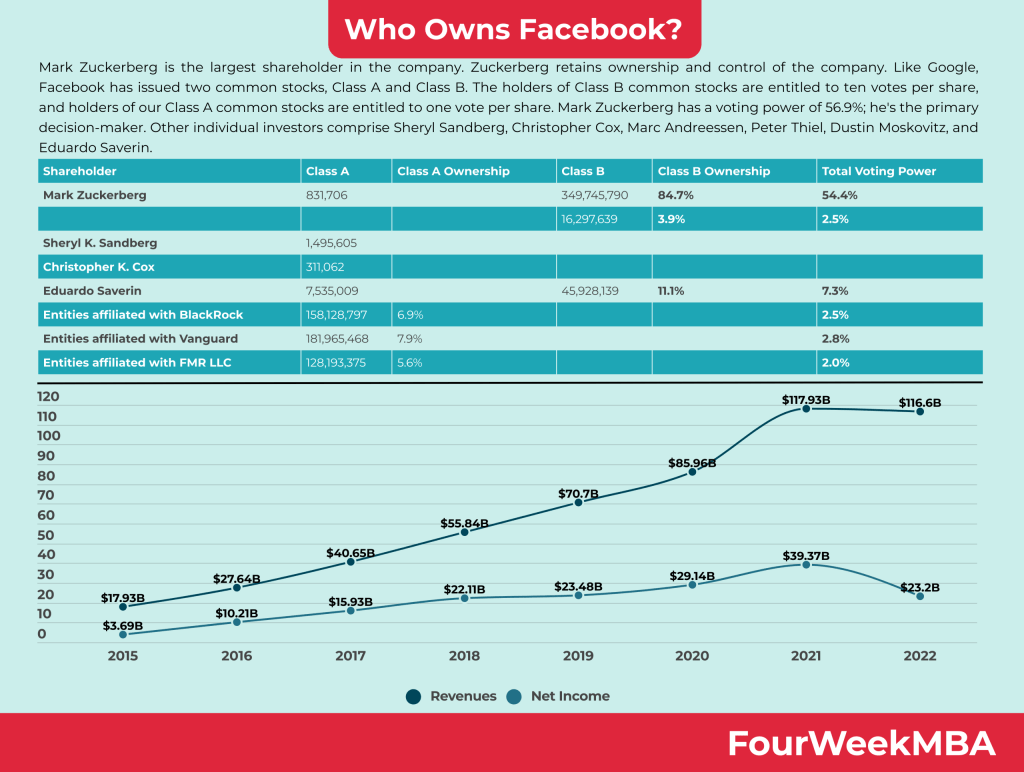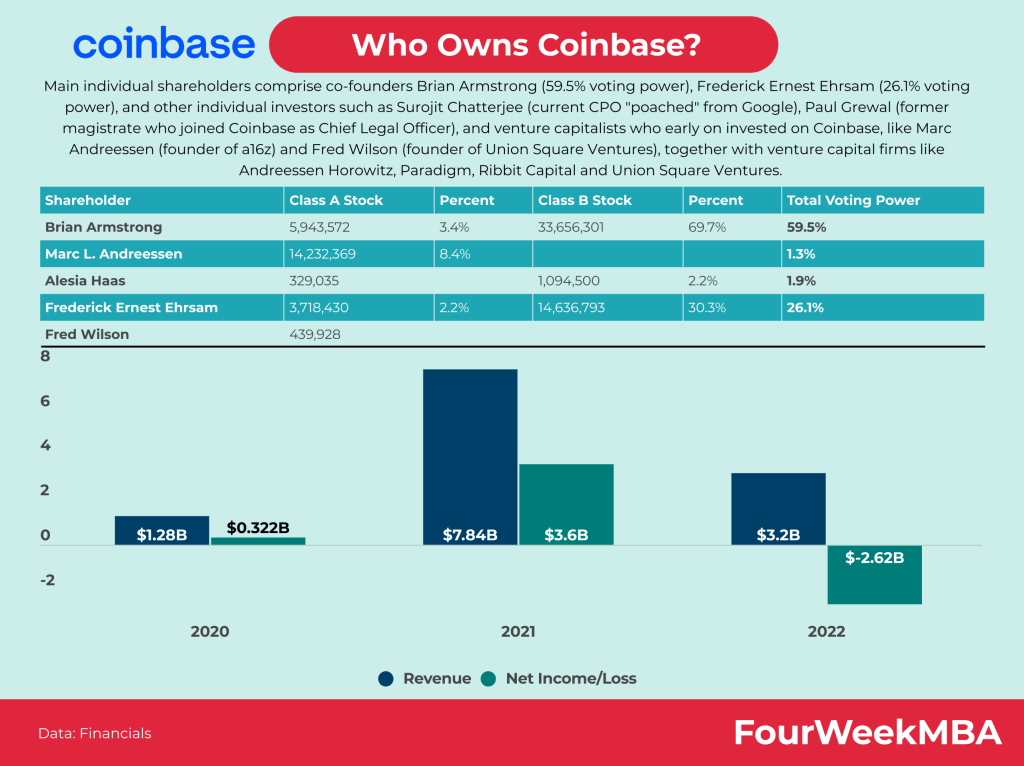Oracle’s main shareholder is founder Larry Ellison, which owns almost 43% of the company’s stocks—followed by Chief Executive Officer of Oracle, Safra A. Catz. Other individual shareholders comprise executive vice president and chief corporate architect Edward Screven and vice chairman Jeffrey Henley. The top institutional investor is The Vanguard Group, with 5.3% of the company’s stock.
| Aspect | Description | Analysis | Examples |
|---|---|---|---|
| Products and Services | Oracle offers a wide range of products and services related to database management systems (DBMS), cloud computing, enterprise software, and hardware. These include Oracle Database, Oracle Cloud Infrastructure (OCI), Oracle Fusion Applications, and more. | Oracle’s product portfolio spans various IT needs, allowing them to serve enterprises comprehensively. | Oracle Database for data management, Oracle Cloud for cloud infrastructure services. |
| Revenue Streams | Oracle generates revenue through various streams, including software licensing and support, cloud services, hardware sales, and consulting and professional services. Cloud services and support provide recurring revenue. | A diversified revenue stream minimizes risk and enhances stability. The shift to cloud services aligns with industry trends. | Oracle Database licensing, Oracle Cloud Infrastructure subscriptions. |
| Customer Segments | Oracle primarily serves large enterprises, including corporations, government organizations, and educational institutions. It caters to a wide range of industries, from finance to healthcare. | Focusing on large enterprises provides substantial revenue potential, but also comes with complex sales cycles and customization requirements. | Oracle solutions for financial institutions, Oracle Cloud for government agencies. |
| Distribution Channels | Oracle distributes its products and services through direct sales teams, partner networks, and cloud platforms. The company relies on a mix of direct and indirect sales channels to reach its customer base. | Leveraging both direct and indirect channels extends Oracle’s reach and flexibility in serving diverse customers. | Oracle sales representatives, Oracle PartnerNetwork, Oracle Cloud Marketplace. |
| Key Partnerships | Oracle collaborates with hardware manufacturers (e.g., Intel), software developers (e.g., Microsoft), system integrators, and cloud providers to expand its product ecosystem. | Strategic partnerships enhance Oracle’s product offerings and market presence. | Integration of Oracle Database with Microsoft Azure, partnership with IBM for cloud services. |
| Key Resources | Oracle’s key resources include its extensive software development teams, data centers for cloud infrastructure, sales and marketing teams, and a vast customer base. | Software development and cloud infrastructure are critical for Oracle’s competitiveness. The vast customer base offers opportunities for upselling and cross-selling. | Oracle software development teams, Oracle Cloud data centers. |
| Cost Structure | Oracle incurs costs in research and development, marketing and sales, data center maintenance, customer support, and employee salaries. | R&D investments are crucial for product innovation and competitiveness. Marketing and sales costs support market reach and sales growth. | Research and development for Oracle Database updates, marketing campaigns, data center maintenance. |
| Competitive Advantage | Oracle’s competitive advantage lies in its long-standing presence in the database management market, its comprehensive product ecosystem, and its focus on serving large enterprises. | Oracle’s database solutions are widely used in the enterprise world. Offering a complete suite of products and services enhances customer loyalty and lock-in. | Oracle Database’s reliability, Oracle Cloud’s integrated offerings. |
| Value Proposition | Oracle provides comprehensive IT solutions for large enterprises, ensuring data management, cloud computing, and business applications are secure, scalable, and efficient. | Oracle’s value proposition centers on reliability, scalability, and security for mission-critical enterprise operations. | Ensuring data security with Oracle Database, enabling scalability with Oracle Cloud Infrastructure. |
Business Model:
- Oracle’s business model revolves around selling software licenses, cloud services, and enterprise solutions to businesses and organizations.
- The company offers a comprehensive suite of products that cater to various aspects of enterprise operations, including database management, cloud infrastructure, applications, and more.
- Oracle generates revenue through licensing its software products and providing ongoing support and services to its customers.
Ownership Structure:
- The main shareholder of Oracle is founder Larry Ellison, who owns almost 43% of the company’s stocks.
- Other significant individual shareholders include Safra A. Catz (CEO), Edward Screven (Executive Vice President and Chief Corporate Architect), and Jeffrey Henley (Vice Chairman).
- The top institutional investor is The Vanguard Group, which holds 5.3% of the company’s stock.
Organizational Structure:
- Oracle follows a traditional corporate organizational structure.
- Safra A. Catz serves as the CEO, leading the company’s overall management and strategic direction.
- The company is divided into various business units, each responsible for specific products and services.
- Oracle’s executive team oversees different aspects of the company’s operations, including technology development, sales, marketing, finance, and legal.
Leadership Style:
- Oracle’s leadership style is driven by a focus on innovation and providing cutting-edge technology solutions to its customers.
- The company places significant emphasis on research and development to continuously improve its product offerings.
- Oracle’s leadership encourages a customer-centric approach, aiming to address the specific needs of businesses and organizations.
Key Takeaways:
- Oracle is a prominent technology company known for its software and enterprise solutions.
- The business model centers around selling software licenses, cloud services, and enterprise solutions to businesses and organizations.
- Founder Larry Ellison is the main shareholder, holding nearly 43% of the company’s stocks.
- Oracle’s leadership style is characterized by innovation and customer-centricity.
Key Highlights:
- About Oracle:
- Oracle is a leading technology company specializing in software and enterprise solutions.
- Ownership Structure:
- Larry Ellison: Founder and primary shareholder, owning approximately 43% of Oracle’s stocks.
- Other Significant Individual Shareholders:
- Safra A. Catz: Current CEO of Oracle.
- Edward Screven: Executive Vice President and Chief Corporate Architect.
- Jeffrey Henley: Vice Chairman of Oracle.
- Institutional Investors:
- The Vanguard Group: Top institutional investor with a 5.3% ownership stake in Oracle.
- Business Model:
- Product Suite: Oracle offers a range of products that cater to enterprise operations, including database management, cloud infrastructure, and applications.
- Revenue Generation: Primarily through software licensing, cloud services, and providing support to its clientele.
- Organizational Structure:
- Leadership: Led by CEO Safra A. Catz, who steers the company’s overall strategic direction.
- Business Units: Oracle is segmented into various units, each responsible for distinct products and services.
- Executive Team: This team manages different facets of the company, from technology development and sales to finance and legal matters.
- Leadership Style:
- Innovation-Driven: Oracle emphasizes R&D to enhance its product offerings continually.
- Customer-Centric Approach: Oracle’s leadership prioritizes addressing the unique requirements of businesses and organizations.
- Conclusion:
- Oracle stands out in the tech industry for its vast array of software and enterprise solutions.
- The company’s ownership is primarily concentrated with founder Larry Ellison, complemented by other significant individual stakeholders and institutional investors.
- Oracle’s business model, organizational structure, and leadership style emphasize innovation, customer focus, and continuous improvement.
Related Visual Stories






Related Tech Ownership Case Studies


























Read More:









